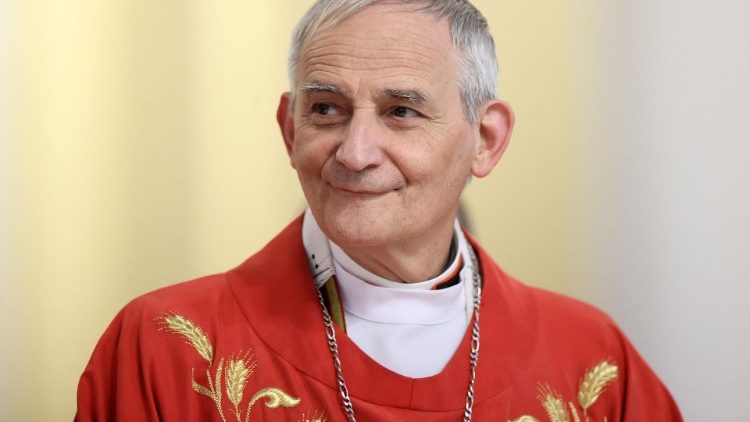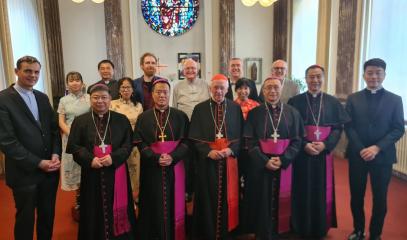Card Zuppi travels to Beijing to talk peace in Ukraine while Chinese bishops visit Belgium
The archbishop of Bologna continues the mission entrusted to him by Pope Francis. If, as some media reports suggest, he will meet Premier Li Qiang, this will be the first high-level meeting between a top Church official and the head of government of the People's Republic. Meanwhile, four Chinese prelates are in Europe with government approval; in Leuven (Belgium), they met with the Verbiest Foundation to restart an exchange programme to train Chinese priests and lay people.
Vatican City (AsiaNews) – Card Matteo Zuppi, archbishop of Bologna and president of the Catholic Bishops' Conference of Italy, is set to leave for Beijing, part of a mission Pope Francis entrusted to him to reach peace in Ukraine. To this end, the prelate travelled to Kyiv, Moscow and Washington earlier in the summer.
The first report about the trip appeared in the Italian newspaper La Repubblica and was confirmed by sources contacted by AsiaNews, later officially announced by the Holy See. Card Zuppi will be in Beijing from 13 to 15 September along with an official of the Vatican Secretariat of State.
In Beijing, the Vatican diplomat could meet with Chinese Premier Li Qiang, this according to Italian press reports, which also suggest that Italian Foreign Minister Antonio Tajani, who recently returned from a visit to China, might have played a role in arranging it.
If such a meeting were to take place, it would be a first between a top Catholic Church official and a head of government of the People's Republic of China, which broke off diplomatic relations with the Vatican in 1951.
The only other comparable high-profile meeting occurred in February 2020 in Munich between the Secretary for Relations with States Archbishop Paul Richard Gallagher and Chinese Foreign Minister Wang Yi, on the sidelines of the Munich Security Conference.
Yesterday Card Zuppi was in Berlin for an international meeting of religions for peace promoted by the Community of Sant'Egidio; during a Q&A session with the press, he answered questions about his mission in China, something that Pope Francis has already spoken about. Skirting questions about his departure, he said that it is well known that the Holy See and China move very slowly.
The ways of peace are sometimes “unpredictable,” he added, requiring “the commitment and involvement of all and a great alliance for peace to push in the same direction.” Above all, "it is never something that can be imposed by anyone; it must be the peace chosen by Ukrainians with the guarantees, commitment and effort of everyone.”
Although closely linked to the Vatican's attempts to stop the war unleashed a year and a half ago by the Russian invasion of Ukraine, Card Zuppi’s trip undoubtedly also represents a step forward in relations between Beijing and the Vatican after the frictions of recent months.
It comes significantly a few days after Pope Francis extended a hand again to Chinese authorities, during his apostolic journey to Ulaanbaatar.
Another apparently smaller but no less significant step comes from Belgium, a sign of a certain thaw in relations. While Card Zuppi is set to leave for Beijing, four bishops from mainland China (picture 2) were allowed to travel to Europe.
CathoBel, the official website of the Catholic Church for Francophone Belgium, reports that the four Chinese bishops visited the European country from 7 to 9 September at the invitation of Card Jozef De Kesel, archbishop emeritus of Mechelen-Brussels and president of the Verbiest Foundation of Leuven (Louvain), the Scheut missionary study centre that has promoted exchanges and initiatives with the Church in China for over 40 years.
The delegation included Bishop Joseph Guo Gincai of Chengde and Bishop Liu Xinghong of Anhui (whose excommunication Pope Francis lifted with the 2018 agreement), Bishop Paul Pei Junmin of Shenyang and Bishop Francis Cui Qingqi of Wuhan, the last one being appointed only two years ago in accordance with the China-Holy See agreement.
The four bishops were authorised to negotiate with the Verbiest Foundation to resume the exchange programme after it was suspended due to the COVID-19 pandemic.
Since 2015 the Leuven-based foundation has offered an intensive, one month-long training course for Chinese priests, religious and laity centred on pastoral care, catechesis, social teaching, and spirituality. The course always ended with a pilgrimage to Rome to see the pope.
During their Belgian visit, the Chinese prelates visited the tomb of Fr Theofiel Verbiest, the founder of the Congregation of the Immaculate Heart of Mary (CICM), also known as the Scheut Missionaries, and paid homage to the members of the congregation who followed in his footsteps in the missions of northern China between 1865 and 1949. Some 252 are buried in that country.
The visit to Europe, however, is not limited to Belgium. According to CathoBel, after Belgium the bishops went to France, where Fr Jean Charbonnier, another great builder of bridges with the Church in China, passed away a few months ago.
Hosted by the Missions étrangères de Paris, the bishops are expected to meet with top officials of the Catholic Bishops’ Conference of France to further develop their knowledge of the local Church.
“These visits are an important step on the path of dialogue and exchange, in full harmony with Pope Francis,” said Fr Jeroom Heyndrickx, of the Scheut Missionaries, speaking to CathoBel.








.png)










